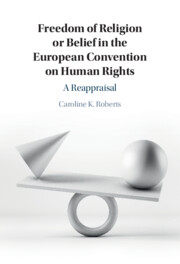Book contents
- Freedom of Religion or Belief in The European Convention on Human Rights
- Freedom of Religion or Belief in the European Convention on Human Rights
- Copyright page
- Dedication
- Contents
- Preface
- Acknowledgements
- Table of Cases, Applications and Communications
- Table of Treaties, Declarations and Other International Instruments
- Abbreviations
- Introduction
- Part I The Understanding of the Right to Freedom of Thought, Conscience and Religion in Echr Article 9
- 1 The Classic Approach in the Literature to ECHR Article 9
- 2 The Text of ECHR Article 9 and Provisions in Related International Instruments
- 3 The ECtHR’s General Principles Concerning ECHR Article 9
- Part II The ECtHR’s application of its general principles concerning the right to freedom of thought, conscience and religion in echr article 9
- Part III reappraising the understanding of the right to freedom of thought, conscience and religion in echr article 9
- Bibliography
- Index
1 - The Classic Approach in the Literature to ECHR Article 9
from Part I - The Understanding of the Right to Freedom of Thought, Conscience and Religion in Echr Article 9
Published online by Cambridge University Press: 02 December 2023
- Freedom of Religion or Belief in The European Convention on Human Rights
- Freedom of Religion or Belief in the European Convention on Human Rights
- Copyright page
- Dedication
- Contents
- Preface
- Acknowledgements
- Table of Cases, Applications and Communications
- Table of Treaties, Declarations and Other International Instruments
- Abbreviations
- Introduction
- Part I The Understanding of the Right to Freedom of Thought, Conscience and Religion in Echr Article 9
- 1 The Classic Approach in the Literature to ECHR Article 9
- 2 The Text of ECHR Article 9 and Provisions in Related International Instruments
- 3 The ECtHR’s General Principles Concerning ECHR Article 9
- Part II The ECtHR’s application of its general principles concerning the right to freedom of thought, conscience and religion in echr article 9
- Part III reappraising the understanding of the right to freedom of thought, conscience and religion in echr article 9
- Bibliography
- Index
Summary
Part I reviews the scholarly literature relating to the right to freedom of thought, conscience and religion and challenges the classic approach to this right. Chapter 1 discusses the origin and meaning of the terms ‘forum internum’ and ‘forum externum’. It explains that, in the literature, there is a general consensus that there is a clear binary and hierarchical distinction between the absolutely protected forum internum and the qualified forum externum in the architecture of ECHR Article 9, and that this distinction features in the related ECtHR jurisprudence. It then explores criticisms raised by commentators relating to the ECtHR’s understanding and application of this distinction, and notes some suggestions made by commentators to resolve the issues. Finally, it examines the way in which this classic approach to the right and its protection by the ECtHR has evolved. It questions the veracity of claims that there is, or should be, such a distinction between the forum internum and forum externum in ECHR Article 9 and related ECtHR jurisprudence, and suggests that a review of the understanding this Article and the case law is not only necessary but overdue.
- Type
- Chapter
- Information
- Freedom of Religion or Belief in the European Convention on Human RightsA Reappraisal, pp. 13 - 30Publisher: Cambridge University PressPrint publication year: 2023

